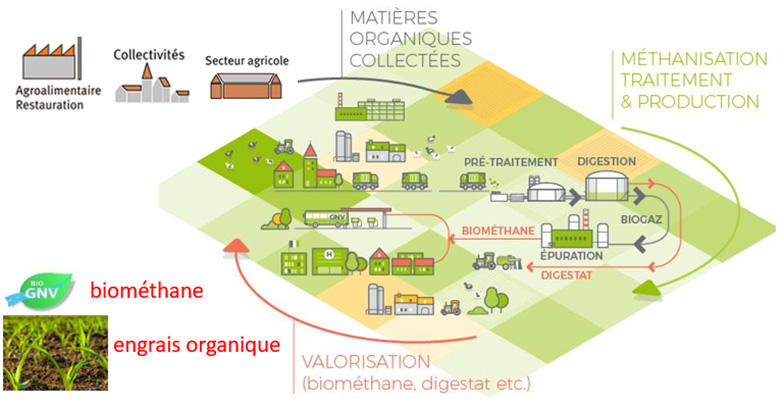Atlante Gestion participated last July in the financing of two territorial methanization projects in France whose development is ensured by the CVE Group, for an amount of €3 058 000.
Two projects of territorial methanization under construction
The key player in the biogas and renewable energy sector – CVE – has partnered with Atlante Gestion to finance the construction of two projects, which consist in the installation of two territorial methanization units: Equimeth – developed in partnership with Ile-de-France Energies – and De Breuilh. These projects are currently under construction and have obtained all their administrative authorizations, i.e. a building permit, a connection offer and a secure gas purchase tariff. They have also already get bank financing.
Located respectively in the Dordogne and Seine et Marne departments, the De Breuilh and Equimeth methanization units are designed to treat and recycle organic matter in the region. They will produce biomethane, which by 2022 will be injected locally into the natural gas distribution network, as well as an organo-mineral fertilizer, which will also be recovered locally via Regener (the CVE service offering dedicated to agronomic solutions).
Contributing to financing the Ernergy Transition
The investment follows the public objectives of improving the energy performance of the territories by financing projects that reduce energy consumption and contribute to the Energy Transition.
More than 40,000 metric tons of organic matter will be processed each year by the two facilities, which will produce around 40,000,000 kWH of biomethane per year*. This is equivalent to the annual gas consumtion of nearly 3,440 french households**. Thanks to the installations, 10,000 tons of CO2 will be avoided per year.
How does methanization work ?
Methanization is a phenomenon that produces biogas energy, through the decomposition and fermentation of organic matter. This natural process is due to the action of micro-organisms that digest organic matter. The digestion occurs naturally in certain environments, for example in marshes.
It can also be reproduced by human action, by heating and stirring the organic matter in hermetic enclosures called digesters with total absence of contact with oxygen. The process must be controlled at all times in terms of temperature and pressure, and lasts from 20 to 40 days. Methanization is used for energy production and sale, and also provides a natural and organic amendment for agriculture: the digestate.
The biogas produced by methanation is a 100% renewable energy, which contains between 40 and 60% methane (CH4) for almost as much carbon dioxide (CO2).

The project developer – CVE, a committed producer and supplier of renewable energies
CVE is an independent producer of multi-energy and multi-country renewable energies, active in the solar photovoltaic, biogas and hydroelectricity markets. 50% of its business is conducted in France from the headquarters in Marseille, but the group also realizes operations in Chile and in the United States and is expanding in Africa.
CVE defends a market vision based on decentralized energy production and a direct energy sales model. The group’s objective is to respond to the energy and environmental needs of companies and communities through the services provision.
- Created in 2009
- 180 employees
- €525 million invested in assets
- 345 MW of capacity in operation and under construction
- 1,300 MW of portfolio
- 560 GWh of annual production
- €65 million of full year revenues
TO LEARN MORE: http://www.cvegroup.com/
*productible forecast based on the data collected during the studies
**gas consumption per household in France – 11,620 kWh/year (source: World Bank)